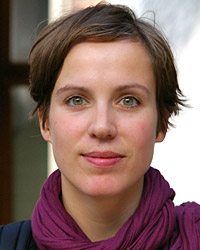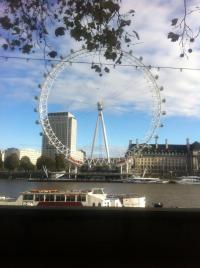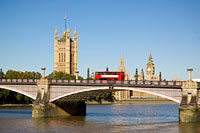Odile Bodde at King’s College London
Odile Bodde tells about her stay in London at King's College...
Why King’s College?
 Last semester I stayed at King’s College London to work on my PhD. Already during my undergraduate studies I became acquainted with the extensive work of Prof Richard Dyer on film and cultural studies. When I started working on my PhD, in which I analyse the aesthetics and politics of torture in contemporary Hollywood and European film on the ‘war on terror’, I kept returning to Dyer’s work as a valuable source for understanding the interaction between film and identity politics. When reading that the Guardian University Guide ranks King’s College Film Studies Department as the top film studies department in the UK, I was unsurprised to see Prof. Dyer’s name among the faculty members.
Last semester I stayed at King’s College London to work on my PhD. Already during my undergraduate studies I became acquainted with the extensive work of Prof Richard Dyer on film and cultural studies. When I started working on my PhD, in which I analyse the aesthetics and politics of torture in contemporary Hollywood and European film on the ‘war on terror’, I kept returning to Dyer’s work as a valuable source for understanding the interaction between film and identity politics. When reading that the Guardian University Guide ranks King’s College Film Studies Department as the top film studies department in the UK, I was unsurprised to see Prof. Dyer’s name among the faculty members.
At that moment my plan was born. The combination of living in London for several months, with visiting one of the best film studies departments, with discussing my research with Richard Dyer, was something I simply felt I had to do. After emailing back and forth it seemed that the best way to visit King’s was through the Postgraduate Research Study Abroad Programme. Luckily, my NWO bench fee and financial support from LUCAS and the LUF made it possible to apply and go as soon as I heard that I got in.
The Film Studies department
 Getting to talk to Prof. Dyer was exciting and highly valuable. But also, through him, I met Dr Catherine Wheatley. Her work on Michael Haneke’s films and ethical spectatorship and the feedback I received directly from her proved very useful for my own research. In the UK, PhDs are considered more like students than employees, so my Programme did not entail teaching or organising seminars. I benefitted most from being able to access all KCL’s facilities and being able to talk to members of staff and other PhD students in my field. One of the highlights of my stay was attending the weekly “cinémathèque” film screenings. Introduced by Richard Dyer, these screenings included contemporary and classic films shot on 35mm film. The monthly research seminars organised by the department, in which a staff member hosts a seminar and invites an internal or external speaker, were also memorable evenings.
Getting to talk to Prof. Dyer was exciting and highly valuable. But also, through him, I met Dr Catherine Wheatley. Her work on Michael Haneke’s films and ethical spectatorship and the feedback I received directly from her proved very useful for my own research. In the UK, PhDs are considered more like students than employees, so my Programme did not entail teaching or organising seminars. I benefitted most from being able to access all KCL’s facilities and being able to talk to members of staff and other PhD students in my field. One of the highlights of my stay was attending the weekly “cinémathèque” film screenings. Introduced by Richard Dyer, these screenings included contemporary and classic films shot on 35mm film. The monthly research seminars organised by the department, in which a staff member hosts a seminar and invites an internal or external speaker, were also memorable evenings.
I noticed that these seminars were remarkably well visited by both film studies students and staff. In her blog on her stay at Yale University last semester, Sara Polak noted that the countless talks, workshops and seminars were usually linked to informal gatherings, receptions and drinks. This was, as she also experienced, no doubt a strategy to get people to come. Like Sara, I also felt that these informal gatherings gave me the perfect opportunity to talk about work and make connections at King’s. Apart from that, it was easy to join lectures and seminars organised by other faculties and to experience being part of the community of KCL. My broad interest in all subjects even remotely related to my thesis subject led me to visit seminars in the War Studies department, the Middle Eastern Studies department, and the department of English. As such, I ended up joining, for instance, a speech delivered by Jack Straw (former Home and Foreign Secretary MP) during the Annual Lecture of the British Society for Middle Eastern Studies (BRISMES). I also participated in a seminar with film scholar Dudley Andrew, and a series of seminars organised by the department of English and composed by Seb Franklin and Paul Gilroy. I attended a lecture by journalist Ramita Navai. In short, so many interesting people I previously only knew “on paper” suddenly became living and speaking beings.
Living next to BFI
 Working and studying at King’s Film Studies also means frequent visits to the British Film Institute (BFI), a renowned organisation that bridges research with society. It promotes the development of and access to film and television through a broad range of education initiatives as well as restoration and archival work. The Institute screens the most beautiful old and new films and frequently invites film scholars for lectures or introductions. It also has a comprehensive library, workspace, and a DVD/bookshop that feels like a candy shop to film lovers. I had the luxury of living right next to BFI and its Imax theatre in a KCL student accommodation right on Southbank, where many cultural institutions are located. Living on the foot of Waterloo Bridge made it possible to walk to King’s Strand Campus with Big Ben to my left and the City skyline to my right. Much of my daily work was done in the beautiful Maughan Library, a 19th-century neo-Gothic building on Chancery Lance where (rumour has it) Professor Dumbledore’s office was filmed for the Harry Potter series. This convergence of a stimulating academic environment with living in the cultural heart of London was an absolutely priceless and productive experience, which will stay with me forever.
Working and studying at King’s Film Studies also means frequent visits to the British Film Institute (BFI), a renowned organisation that bridges research with society. It promotes the development of and access to film and television through a broad range of education initiatives as well as restoration and archival work. The Institute screens the most beautiful old and new films and frequently invites film scholars for lectures or introductions. It also has a comprehensive library, workspace, and a DVD/bookshop that feels like a candy shop to film lovers. I had the luxury of living right next to BFI and its Imax theatre in a KCL student accommodation right on Southbank, where many cultural institutions are located. Living on the foot of Waterloo Bridge made it possible to walk to King’s Strand Campus with Big Ben to my left and the City skyline to my right. Much of my daily work was done in the beautiful Maughan Library, a 19th-century neo-Gothic building on Chancery Lance where (rumour has it) Professor Dumbledore’s office was filmed for the Harry Potter series. This convergence of a stimulating academic environment with living in the cultural heart of London was an absolutely priceless and productive experience, which will stay with me forever.
